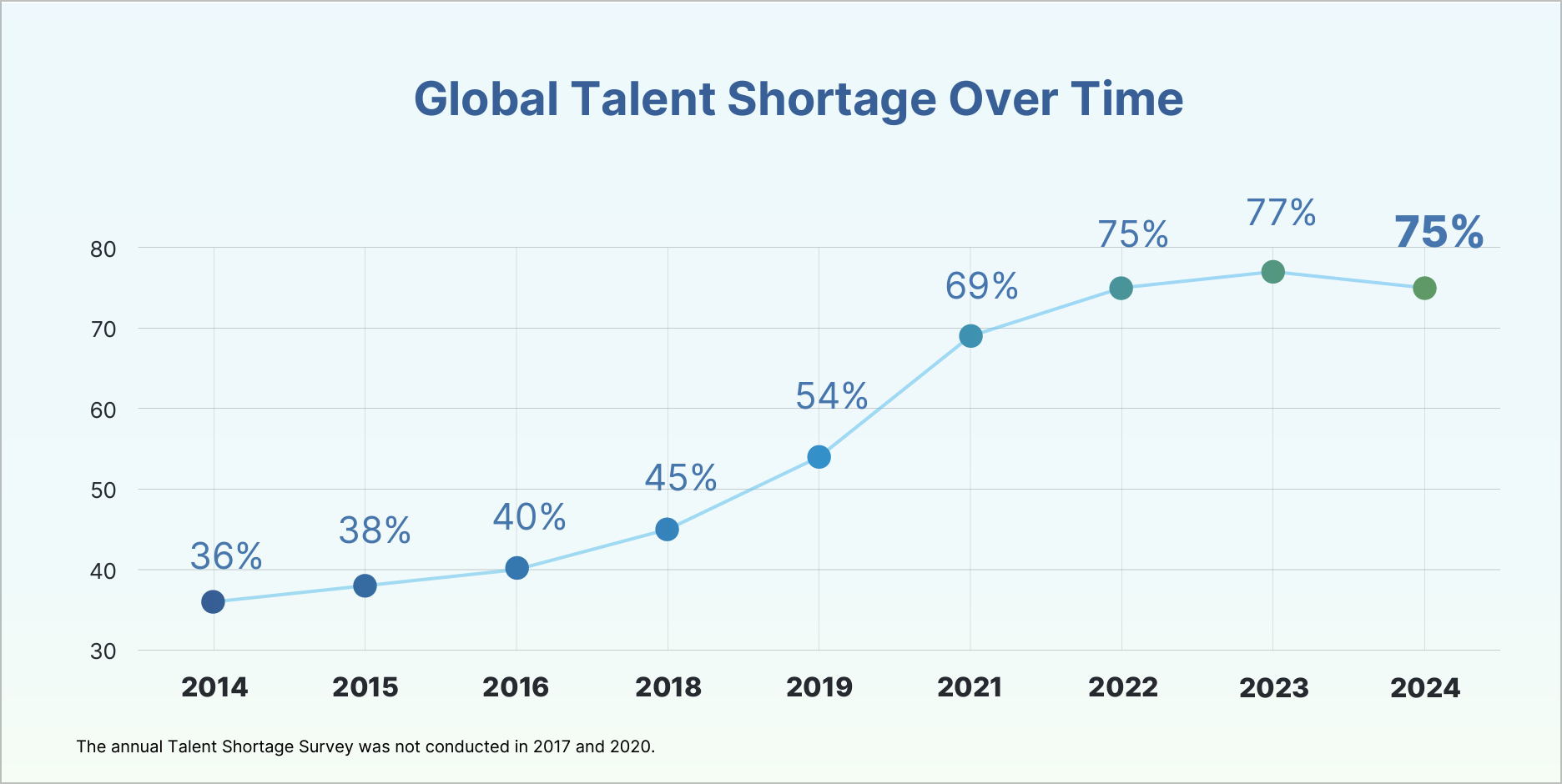Africa is no exception, with an increased demand for highly skilled workers.
Skill shortages are considered one of the most significant risks facing businesses
worldwide. According to a survey by ManPower group, 2024 talent short report, attracting
and retaining skilled workers is a global challenge, 75% of employers report difficulty
in filling roles.

Africa faces a persistent shortage of skilled labor, which hinders its economic
development and growth. This shortage can be attributed to several interrelated factors,
including the limited contribution of tertiary education to the growth of skilled labor,
educational system deficiencies, and mismatches between educational outcomes and labor
market needs.
Several factors contribute to the persistent and increasing shortage of skilled labour
in Africa, including:
Limited Tertiary Education Contribution
One of the critical issues is the limited contribution of tertiary education to the
growth of skilled labor. According to a report by the African Development Bank, the
unemployment rate for individuals with higher education exceeds 50% in many Sub-Saharan
African countries. This statistic highlights a paradox where higher education does not
necessarily equate to employment. The report also indicates that many educational
indicators in Africa have stagnated or even deteriorated, making it unlikely that the
continent will meet its education commitments by 2030. This stagnation reflects broader
systemic issues within the education sector, including underfunding, outdated curricula,
and insufficient emphasis on practical skills.
Quality and Relevance of Education
Another significant factor contributing to the shortage of skilled labor is the quality
and relevance of education. A study by the World Bank criticized African universities
for not teaching the cutting-edge skills that employers demand. The curriculum in many
institutions of higher learning is often outdated, focusing more on theoretical
knowledge than on practical, marketable skills. This disconnect means that graduates are
often ill-prepared for the modern workforce, lacking essential skills in technology,
critical thinking, and problem-solving that are crucial for today’s job market.
Mismatch Between Education and Labor Market Needs
There is also a significant mismatch between the education system and labor market
needs. Many African countries have educational systems that do not align with the
requirements of the local and global job markets. This misalignment results in graduates
who are educated but not employable. For instance, while there is a high demand for
professionals in science, technology, engineering, and mathematics (STEM) fields,
African universities often produce more graduates in fields like humanities and social
sciences, where job opportunities are relatively scarce.
Structural Challenges in the Education System
The structural challenges within the African education system further exacerbate the
problem. These challenges include:
Underfunding: Many African countries spend a low percentage of their GDP on
education,
resulting in poorly equipped schools, inadequate teaching materials, and underpaid
teachers.
Inadequate Infrastructure: Many educational institutions lack the necessary
infrastructure, such as laboratories, libraries, and internet access, which are
essential for providing a quality education.
Brain Drain: There is a significant brain drain, where the most talented and
skilled
individuals emigrate to other countries in search of better opportunities, leaving a gap
in the local labor market.
Teacher Quality and Training: The quality of teachers and their training is often
subpar, affecting the overall quality of education delivered to students.
Policy and Institutional Weaknesses
Policy and institutional weaknesses also play a crucial role. Many African countries
lack coherent policies and robust institutions to support education and labor market
integration. Policies often fail to incentivize industries to invest in education and
training, and there is a lack of effective vocational training programs that could
provide alternative pathways to skilled employment.
Socio-Economic Barriers
Socio-economic barriers, including poverty and inequality, limit access to education for
many. In rural and underprivileged areas, children are less likely to complete primary
education, let alone pursue tertiary education. Girls, in particular, face additional
barriers, such as early marriage and gender-based violence, which hinder their
educational attainment.
Recommendations for Addressing the Skilled Labor Shortage
To address the skilled labor shortage in Africa, several strategies should be
considered:
Curriculum Reform: Updating university curricula to include more practical and
marketable skills, particularly in STEM fields.
Increased Investment: Governments and private sector partners need to increase
investment in the education sector, focusing on infrastructure, teacher training, and
educational materials.
Industry-Academia Collaboration: Strengthening partnerships between educational
institutions and industries to ensure that graduates possess the skills that employers
need.
Vocational Training: Expanding and improving vocational training programs to
provide alternative pathways to skilled employment.
Retention Strategies: Implementing strategies to retain skilled labor within the
continent, such as creating favorable working conditions and opportunities for
professional growth.
Policy and Governance: Enhancing policy frameworks and institutional capacities
to support education and labor market integration effectively.
2. UNESCO. (2019). "Education in Africa: Key Facts and Figures."
3. World Bank. (2021). "The Skills Balancing Act in Sub-Saharan Africa."
4. OECD. (2020). "Education at a Glance 2020: OECD Indicators."
5. McKinsey & Company. (2019). "Reimagining higher education in Africa."
6. UNESCO Institute for Statistics. (2019). "Education Expenditure Database."
7. World Bank. (2019). "Africa Human Capital Plan."
8. International Organization for Migration. (2020). "World Migration Report 2020."
9. Education Commission. (2017). "The Learning Generation: Investing in Education for a Changing World."
10. African Union. (2019). "Continental Education Strategy for Africa 2016-2025."
11. UNICEF. (2018). "Child Marriage in Africa."
12. African Development Bank Group. (2020). "Education and Skills for Inclusive Growth in Africa."
13. Global Partnership for Education. (2020). "Transforming Education in Africa."
14. International Labour Organization. (2018). "Skills for Employment Policy Brief."
15. UNESCO-UNEVOC. (2020). "TVET in Africa: Challenges and Prospects."
16. World Economic Forum. (2017). "The Future of Jobs and Skills in Africa."
17. African Development Bank Group. (2018). "Policies for Better Education and Employment Outcomes in Africa."
